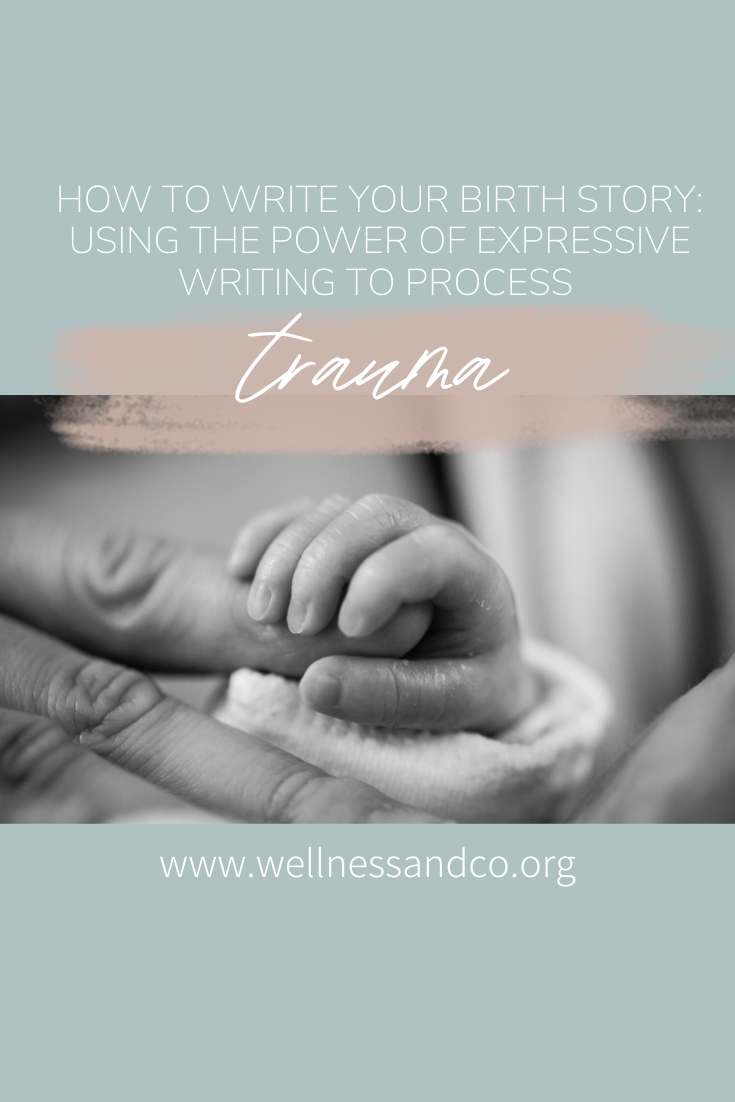Follow
Wellness & Co.
Hi, I'm Dr. K, Wellness & Co. is a growing therapy/coaching practice and educational hub for prospective clients based in Maryland and virtual clients all over the world!
Hi, I'm Dr. K
free guide
e -books
e -course
How to Write Your Birth Story: Using The Power of Expressive Writing to Process Trauma
March 12, 2020
by Erin Newton, LCPC
At the end of May 2019, we wrapped up the first birth trauma therapy group here at Wellness & Co. For eight weeks, four mamas learned; developed relationships; processed through hurt, pain, abandonment, and anger; and worked on forgiving themselves for not making choices they might have made had they felt empowered to do so. It was a privilege for me to watch them work through their struggles together, especially as a survivor of birth trauma myself. It was amazing to watch a mother soften in her judgement of herself and also feel completely accepted by those around her, something that these women admitted to previously not feeling very often, if ever.

One of the most powerful moments in the group came at the final session when group members shared the birth stories they had been working on at home for the last eight weeks, an assignment that was a struggle for many. We would discuss each week what was holding them back from wading just a little deeper into their pain. The answer was always that it was hard, that it was painful to sit with those feelings, that they would start crying before they even wrote anything. I would encourage them to take time to sit with that pain rather than pushing it away, to make time to focus on themselves and what they were experiencing.
Why writing?
Therapists know that writing is often essential for working through trauma, as it acts as a form of meditation and healing for the brain. It’s a place to safely release and explore strong, uncomfortable feelings, and provides space for new interpretations and different perspectives. Often I will have clients write freely about how they are feeling in the moment, only to have them read their entry days later with fresh eyes and completely different feelings.
Writing is also important in working through trauma because it slows down the processing of intense memories and allows you to express feelings that you often struggle to express out loud.
Journaling about trauma will at times elicit a new thought or feeling that you were not aware of consciously and wouldn’t be able to work through without this acknowledgement.
Another benefit that clients often find is that of forgiveness. Sometimes it’s easier to forgive yourself looking through a lens of depersonalization, meaning that it’s easier to forgive others for your same perceived mistakes than it is to forgive yourself.
Multiple bodies of research on expressive writing have found it to be not only mentally beneficial, but physically as well. Research published in the September issue of the APA’s Journal of Experimental Psychology: General (JEP: General) (Vol. 130, No. 3) found that expressive writing reduces intrusive and avoidant thoughts about negative events and improves working memory. Researchers believe that in turn, this frees up cognitive resources for other mental activities, such as the ability to better utilize coping skills, which in turn, reduces stress. This means that for some people journaling about trauma can lead to less stress in general and a better capacity to use coping skills.
Another study, co-authored by Professor Elizabeth Broadbent in 2013, found that expressive writing can have physical benefits. This study found that 76% of adults who spent 20 minutes a day for two weeks writing about their thoughts and feelings before a medically-necessary procedure were fully healed 11 days after their procedure. Meanwhile, 58% of the control group, who did not record their thoughts and feelings, had not yet recovered. Could it be that something about expressive writing allows the brain to heal what the body might not even know that it’s holding onto?
Keep in Mind….
If you decide to start journaling about your birth trauma, there are several things you should be aware of.
-
If there are pieces of your story that you can’t remember or that seem unclear or unfinished to you, that’s ok. More may be revealed as you continue to process or you may need a therapist to help you unlock those lost pieces.
-
If you start to feel overwhelmed, try to take a few deep breaths to center yourself. Consider using calming music, candles, or scented oils to aid in grounding. If this process is really hard for you, consider limiting the time, say for 30 minutes. Try very hard to stay with the feeling, even if it’s uncomfortable and sad. Sitting with the feeling is important to the process of healing and ultimately feeling better.
-
If at any time in this process you feel unsafe, reach out to the people in your life who are a source of comfort for you. Use local crisis lines, such as Harford County’s Crisis Line: 410-874-0711. Consider seeking out a therapist if this process is too overwhelming for you to accomplish on your own.
This practice of journaling and writing about different feelings and emotions after a traumatic experience can be surprisingly healing. This doesn’t have to be limited to birth trauma and can in fact apply to all types of trauma and even in situations where there isn’t trauma, but instead feelings that have yet to be processed and worked through. Many clients find it helpful to write journal entries when they’re sad or anxious or to write letters to loved ones(many that will not be sent). If you have experienced a traumatic event, consider using this process to aid in your journey towards healing.
Interested in how to get started writing your birth story? Following along the next couple months as we walk through the different ways to use this type of writing to express your feelings about your trauma, in four separate blog posts! Or, check out REBIRTH, an in-person therapy group designed to help start the process of expressing and working through birth trauma while connecting with other birth trauma survivors. The next session of the REBIRTH group starts Wednesday, September 4th at 6:00 pm and runs for eight weeks. For details, check out harcomft.com, email Erin Newton at erin.newton@wellnessandco.org or call at 570-689-8130.
With hope for healing,
-Erin Newton, LCPC
For more information on birth trauma, how to write your birth story, and processing trauma, consider the following books:
Birth Trauma by Kim Thomas
How to Heal a Bad Birth by Melissa Bruijn and Debby Gould
Heal Your Birth Story: Releasing the Unexpected by Maureen Campion
GET THE FREE E-GUIDE!
Erin Newton has been working with individuals and families for almost nine years now. She specializes in perinatal mental health, birth trauma, and anxiety related issues. She strives to help her clients feel seen, heard, understood and to give them the tools they need to start their own journey of healing.
CONTACT
Start Here
BLOG
OUR TEAM
SHOP
ABOUT
©2025 Wellness & Co. | All Rights Reserved | Design by EverMint Design Studio
BACK TO TOP
connect with us on instagram

